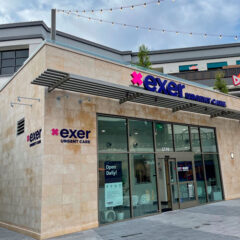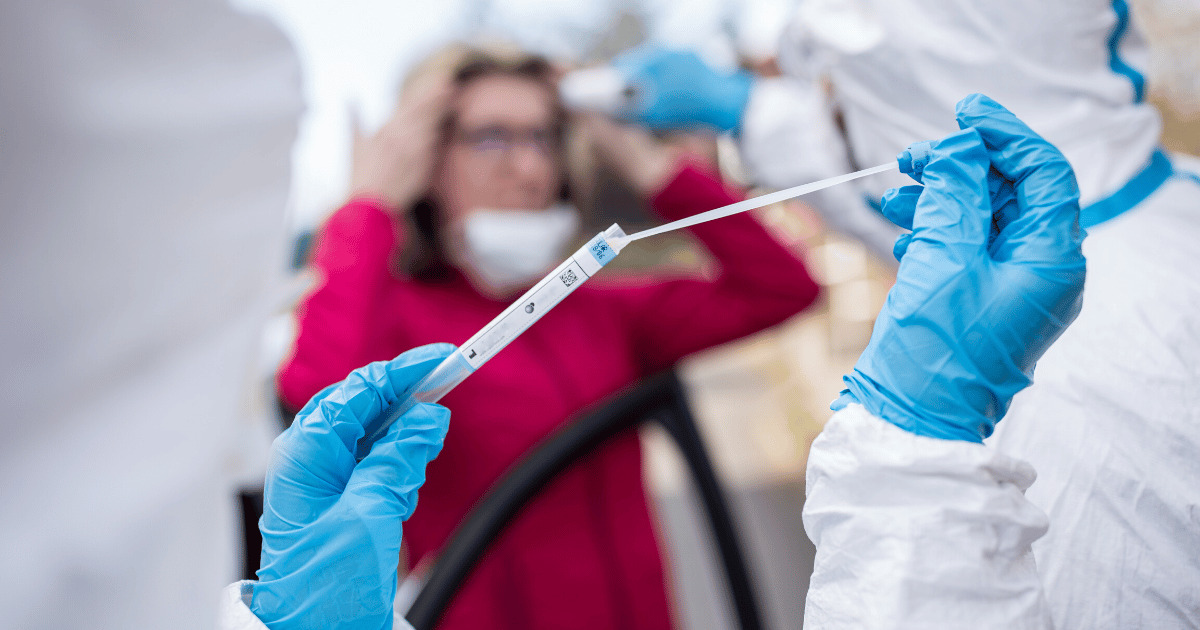Do you know about the differences between rapid antigen tests and PCR tests, and which one might be more appropriate to your needs? Are you aware of what happens in the lab after a swab is taken from your nose for COVID-19 testing? What does it really mean to have COVID-19 antibodies?
It’s crucial to answer these questions if you are considering testing for COVID-19. Understanding the features of different types of COVID-19 tests can help you decide which test to go for based on your unique situation. In this guide, we will answer common questions surrounding these tests, explore the purpose of each test, and guide you on where to get tested safely and reliably.
How to Tell if You Have COVID-19?
The COVID-19 disease causing coronavirus SARS-CoV-2 and its variants can cause a wide range of symptoms. Some people with the virus have mild symptoms, while others may become seriously ill. Here are the common symptoms typically associated with this virus:
- Cough
- Fever or chills
- Difficulty breathing or shortness of breath
- Congestion or runny nose
- Headache
- Fatigue
- Sore throat
- Nausea or vomiting
- New loss of smell or taste
- Muscle or body aches
- Diarrhea
Most of these symptoms are common to all variants of COVID-19. However, there have been reports that some variants, such as Delta and Omicron, might cause slightly different symptoms. For example, with the Delta variant, people are more likely to report headaches, sore throat, runny nose, and fever, while the loss of smell was less common than with the original virus.
People infected with the Omicron variant may experience symptoms more akin to a common cold, such as a scratchy throat, muscle ache, mild cough, and runny nose, along with fatigue. That said, please keep in mind that these symptoms can vary significantly from person to person.
If you are feeling unwell and suspect it may be COVID, your best course of action is to get tested at your nearest Exer Urgent Care clinic and follow the advice of healthcare professionals. Also, if you have any symptoms that are severe or concerning, seek immediate medical attention or go to your nearest emergency room.
Different Types of COVID-19 Tests
There are three main types of tests that are available for detecting coronavirus or SARS-CoV-2:
PCR (Polymerase Chain Reaction) Test
The PCR test is known as the ‘gold standard’ when it comes to diagnosing COVID because it looks for the actual virus in your body. The test involves taking a swab from the back of your nose or your throat. This swab then goes to a lab where technicians look for pieces of the virus’s genetic material. This process is a bit like searching for a specific needle in the haystack.
The test is usually done when you have symptoms of COVID-19, or when you’ve been in close contact with someone who has tested positive, but it can also catch the virus before you start feeling unwell. This is because the PCR test is very sensitive and can even find the tiniest amounts of the virus. But it also means you have to wait a bit longer for the results – typically a couple of days.
Antigen Test
Antigen tests, often referred to as “rapid tests”, work a little differently. They don’t look for the virus’s genetic material, instead, they hunt for specific proteins on the virus’s surface.
This test also involves a swab from your nose or throat. However, the advantage of antigen tests is that they don’t require the sample to be sent to a lab for analysis. This means you can receive your results much faster, usually within 15-30 minutes. This quick turnaround time makes antigen tests particularly useful in situations where you need immediate results, such as for screening purposes or quick diagnosis.
While antigen tests provide rapid results, they may not be as accurate as PCR tests. These rapid tests serve as a preliminary check so your doctor can quickly figure out whether you have COVID-19. However, in some cases, there may be false negatives, i.e., the test may not detect the virus even if you are infected. That’s why if you are experiencing COVID symptoms or you’ve had a positive rapid antigen test, it’s recommended to follow up with a confirmatory PCR test for more accurate results.
Antibody (Serology) Test
Now, this test is a bit different from the other two. The PCR and antigen tests are like detectives looking for the virus itself, the antibody test is like a historian. It looks for signs that the virus was there in the past.
During an antibody test, a blood sample is collected, usually through a simple blood draw. This sample is then analyzed in a lab to determine if antibodies against SARS-CoV-2 are present. The test looks for two types of antibodies: IgM and IgG. IgM antibodies typically appear in the early stages of an infection, while IgG antibodies develop later and tend to indicate a past infection or ongoing immune response.
These tests are not used for diagnosing an active COVID-19 infection – instead, they help provide information about previous exposure to the virus and the development of an immune response. Simply put, you should only get this test if you want to know whether you’ve been previously infected with the coronavirus. This can be useful in the following situations:
- If you had symptoms consistent with COVID-19 in the past and want to confirm if it was indeed caused by the virus. It helps determine if your body has developed antibodies in response to a previous infection.
- You may have been infected with COVID-19 but did not experience noticeable symptoms. An antibody test can help identify if you have had an asymptomatic infection and developed antibodies.
- If you have been in close contact with someone who tested positive for COVID-19, an antibody test can provide information on whether you have developed antibodies as a result of potential exposure.
It usually takes 1-2 days to get results. And remember, having antibodies doesn’t necessarily mean you are immune to COVID-19. Plus, with new variants of the virus emerging seemingly every year, the effectiveness of the existing antibodies may not mean that much.
Again, antibody tests are not intended for determining if you are currently infected with the coronavirus. For diagnosing an active infection, viral tests like the PCR or antigen tests are recommended.
What are COVID-19 Variants? Do COVID-19 Tests Tell You the Variant?
The SARS-CoV-2 virus can change slightly each time it spreads from person to person. This is a natural process called mutation, and it can lead to the creation of different versions of the virus, called ‘variants.’
Some variants might not cause any noticeable changes, but others can make the virus spread faster, make people sicker, or even influence how well tests, medicines, or vaccines work. It’s just like a cookie recipe being tweaked over time – some changes might not affect the taste much, but others could make the cookie sweeter or crunchier.
The Omicron variant, for example, became a concern because it spread more easily than earlier versions of the virus. But don’t worry, it seems to cause less severe disease.
COVID-19 tests are designed to tell you if you are infected with the virus. They are reliable and work even with the different variants around because the tests mostly look for a part of the virus that doesn’t change much, even with mutations.
Stemming from this, the types of COVID-19 tests available today (as discussed earlier) don’t tell us which variant of the virus you have. That information requires more detailed lab work. But the good news is that health officials around the world are keeping an eye on these variants, watching out for new ones, and making sure the tests, treatments, and vaccines keep working.
Frequently Asked Questions About COVID-19 Testing
What is the difference between PCR, antigen, and antibody tests?
PCR and antigen tests are diagnostic tests to detect if you currently have COVID-19, with PCR being the most accurate. Antibody tests, however, detect if you had a past infection by looking for antibodies your body might have produced in response.
When should I get tested for COVID-19?
You should get tested if you have symptoms of COVID-19, have been in close contact with someone who tested positive, or if you’ve been asked or referred to get testing by a healthcare provider or local health department.
How accurate are the tests?
PCR tests are very accurate when performed by a healthcare professional. Rapid antigen tests are also accurate but slightly less so than PCR tests. They’re most accurate in the first few days after symptoms appear.
What does it mean if I test positive?
A positive test means that you currently have COVID-19 and should follow the guidelines provided by your doctor or local health department, which usually involve isolating yourself to avoid spreading the virus.
Can I test negative and still have COVID-19?
Yes, it’s possible, especially if you are tested very early or late in your infection. If you have symptoms but test negative, your doctor might recommend a re-test.
Can I get tested even if I don’t have symptoms?
Yes, you can still get tested if you don’t have symptoms, especially if you’ve been in close contact with someone who has COVID-19 or if you’re in a high-risk setting.
Does a negative test mean I can stop taking precautions like social distancing and wearing a mask?
A negative test only means you didn’t have COVID-19 at the time of testing. It’s still important to continue following local health guidelines to prevent catching or spreading the virus.
How does a COVID-19 test tell me which variant I have?
Regular tests can’t specify which variant you have. They simply tell you if you are infected or not. To identify a variant, a special process called genomic sequencing is needed, which can only be done in a state-of-the-art lab testing site.
Is my COVID-19 test still accurate with new variants?
Yes! The Exer PCR tests are still effective at diagnosing COVID-19, including the new variants like Omicron. They target parts of the virus that remain consistent across variants.
What is a COVID-19 vaccine booster?
A booster is an additional vaccine shot you take after the initial series. It helps maintain strong protection against life-threatening COVID symptoms as the protection from the original shot(s) starts to decrease over time.
Who should get a COVID-19 booster shot?
Everyone 5 years and older who has completed their primary vaccine series is recommended to receive an updated (bivalent) booster shot.
When should I get a COVID-19 booster?
You should get a booster shot at least 2 months after your last COVID-19 dose, whether that was your final primary series dose or an original (monovalent) booster dose.
What is the difference between an additional dose and a booster?
A booster is given when protection has decreased over time. An additional dose is given to people with compromised immune systems to improve their response to the initial vaccine series.
Do the vaccines protect against the new COVID-19 variants?
Yes, the vaccines are effective in lowering the risk of severe disease, hospitalization, and death, even with new variants like Omicron and Delta.
What is a bivalent vaccine?
A bivalent vaccine contains components of both the original strain of the SARS-CoV-2 virus and a variant, like Omicron, providing broader protection.
Is coronavirus testing covered by my health plan?
In most cases, health plans do cover COVID-19 testing. However, the coverage can depend on whether the test is considered medically necessary. It’s best to check with your insurance provider for details.
Are COVID-19 treatments and vaccinations covered by my health plan?
Yes, many health plans cover COVID-19 treatments. However, the extent of the coverage may vary, so it’s important to check with your insurance provider. As of now, vaccines are available at no cost to all people living in the United States, regardless of their health insurance status, under federal guidelines.
Where to Get Tested for COVID-19?
If you are wondering where to go for COVID testing options, look no further. With Exer’s extensive network of urgent care clinics throughout Southern California, getting a COVID-19 test is now quick and convenient. Our clinics are open seven days a week, so you can get tested at a time that’s convenient for you.
At our walk-in clinics, you don’t need to schedule an appointment. You can drop in whenever you are ready, and our professional medical team will be there to assist you. Whether you need a rapid antigen test, a PCR test, or an antibody test, Exer Urgent Care has got you covered. Our rapid tests offer results in as little as 15 minutes.
If you are experiencing symptoms discussed in this article, have been in close contact with someone who has tested positive, or require a test for travel or work purposes, please come into one of our Exer Urgent Care locations. We are here to serve all our patients and help keep our community safe.
For more details about our hours of operation, the cost of COVID-19 tests, health insurance acceptance, or anything else, call your nearest Exer Urgent Care clinic.































































